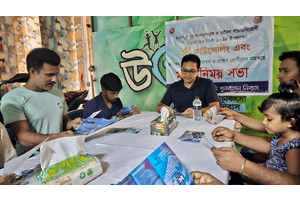 August 1, 2024 0 Comment
August 1, 2024 0 Comment In the bustling environment of urban communities, the challenge of addressing drug addiction treatment requires innovative approaches that foster collaboration and trust. One such approach is the round table meeting, a format that promotes open dialogue and shared decision-making. The Utshob Drug Addiction Treatment Center has effectively utilized these meetings, presided over by their dedicated doctors, to engage with community members. This article explores the manifold benefits of these round table discussions and their impact on the community.
Building Trust and Understanding
One of the most significant benefits of round table meetings is the creation of a space where trust and understanding can flourish. In urban settings, where drug addiction can often be stigmatized, it is crucial to build bridges between healthcare providers and the community. By involving doctors from the Utshob Drug Addiction Treatment Center, these meetings provide a platform for transparent communication. Community members can express their concerns, share their experiences, and ask questions directly to medical professionals. This interaction helps demystify addiction treatment and fosters a sense of trust in the healthcare system.
Empowering Community Members
Round table meetings empower community members by giving them a voice in the conversation about drug addiction. When individuals feel heard and valued, they are more likely to participate actively in initiatives aimed at addressing addiction. The inclusive nature of these meetings ensures that diverse perspectives are considered, leading to more comprehensive and culturally sensitive solutions. Empowerment also extends to self-advocacy, where community members can become champions of change within their neighborhoods, promoting awareness and support for addiction treatment.
Enhancing Collaboration and Resource Sharing to design effective Drug Addiction Treatment Program
Understanding the unique needs of an urban community is essential for designing effective addiction treatment programs. Through round table meetings, the doctors at Utshob Drug Addiction Treatment Center can gather valuable feedback directly from community members. This feedback helps in tailoring treatment programs to address specific issues such as accessibility, cultural relevance, and the integration of local support systems. By aligning treatment approaches with community needs, the likelihood of successful outcomes increases significantly.
Raising Awareness and Reducing Stigma
Stigma remains a significant barrier to seeking help for drug addiction. Round table meetings serve as powerful tools for raising awareness and reducing stigma. When community members see doctors and other professionals actively engaging in open discussions about addiction, it helps normalize the conversation and dispel myths. Educational sessions during these meetings can provide critical information about the nature of addiction, the effectiveness of treatment options, and the importance of mental health. As awareness grows, so does the community’s capacity to support individuals struggling with addiction.
Facilitating Early Intervention
Early intervention is key to successful addiction treatment. Round table meetings can identify individuals at risk and facilitate timely intervention. Community members are often the first to notice changes in behavior or signs of distress among their peers. By providing a forum for discussing these observations, the doctors from Utshob Drug Addiction Treatment Center can offer guidance on early warning signs and the appropriate steps to take. This proactive approach can prevent the escalation of addiction and improve the chances of recovery.
The round table meetings presided over by the doctors of Utshob Drug Addiction Treatment Center exemplify the power of community engagement in addressing drug addiction. These meetings build trust, empower community members, enhance collaboration, tailor treatment programs, raise awareness, and facilitate early intervention. In an urban setting, where the challenges of addiction are multifaceted and deeply rooted, such innovative approaches are essential. By fostering open dialogue and shared decision-making, Utshob Drug Addiction Treatment Center is not only treating addiction but also strengthening the community’s resilience and capacity to support its members.
The success of these round table meetings highlights the importance of community-centric approaches in healthcare. As other urban communities look for effective strategies to combat drug addiction, the model set by Utshob Drug Addiction Treatment Center offers valuable insights and a blueprint for positive change.
